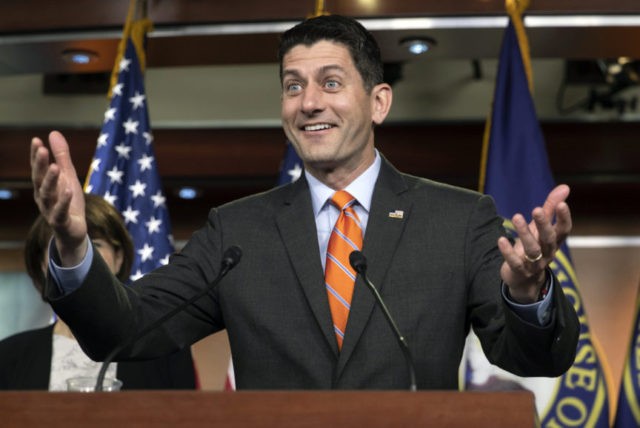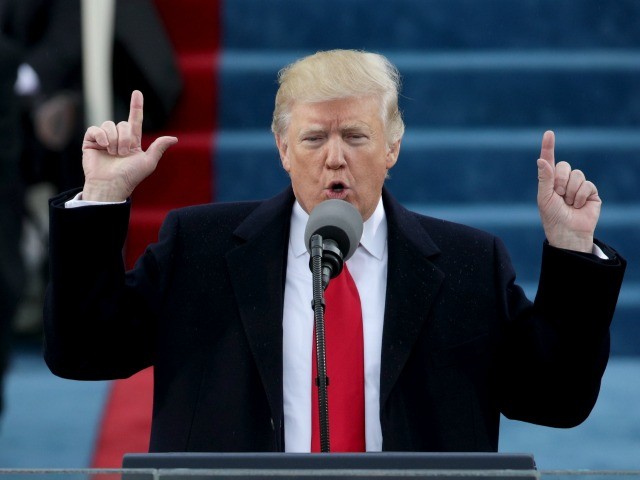House Speaker Paul Ryan said Thursday he hopes to quickly write up an amnesty bill and get it passed through the House.
“The next step is putting pen to paper so we can start getting legislation to the floor,” Ryan told reporters shortly after he held a Thursday-morning meeting with the GOP caucus to push for a wage-cutting amnesty.
Ryan suggested he would try to rush the bill to the floor. “Time is of the essence if we want to have a legislative process that we can control,” he said, referring to the group of 23 GOP legislators who threaten to use the discharge-petition process on June 25 to let Democrats pass their own amnesty.
The bill would reportedly provide an amnesty to at least 1.4 million illegals, and it does not include a cap to prevent fraud or subsequent waves of migrants hoping to join the next amnesty.
CNN reported mid-afternoon that Ryan’s legislation could be drafted “in the next few days.” The claim was made by Florida Rep. Chris Curbelo, a leader in the discharge-petition group whose district is dominated by Democratic-voting immigrant families who were brought into the United States by earlier amnesties.
Ryan has used the threats from Curbelo and his discharge-amnesty group to push mainstream GOP legislators to support a pre-election amnesty vote. Ryan has the political power to shut down the amnesty-petition drive, partly by denying campaign funding to the 23 GOP members who have signed the petition. He also has the legal authority to ensure the House will not be in session during the only two days the amnesty-discharge people can hold their vote.
Ryan is also aided by threats from cheap-labor business groups who stand to lose billions of dollars because of rising wages in Trump’s no-amnesty economy.
These business groups, including the U.S. Chamber of Commerce, are claiming that investors are suffering from a labor shortage. But the 2017 tax cut and record corporate profits do give them the resources to offer higher wages to encourage people to rejoin the workforce or to switch from lower-paying jobs.
Ryan has a history of supporting cheap-labor amnesties and large-scale immigration in California and other states, although this week he praised the recent wage increases. Those rising wages are helping raise Trump’s political ratings and the GOP’s generic-ballot score before the November election. But the wage raises likely will stall before the election if the federal government passes an amnesty that adds at least two million workers to the labor supply.
Amid Ryan’s rush to the floor, populist-minded GOP legislators denied there is amnesty deal.
Throughout the closed meeting and the subsequent press conference, Ryan presented his amnesty as his implementation of President Donald Trump’s four-pillars immigration reform legislation, outlined at the State of the Union speech.
However, Ryan’s still-vague bill would raise the supply of blue-collar and white-collar labor.
That features marks a huge difference from Trump’s plan, which would reduce legal immigration by winding down chain-migration over ten years, and by ending the diversity visa-lottery. In his inauguration speech, Trump also promised a “Hire American” policy, not a Ryan-style hire-an-cheaper-immigrant policy.
Naturally, Trump’s promised reduction in legal immigration is strongly opposed by business groups because it would nudge up white-collar and blue-collar wages.
Ryan’s emerging bill reportedly would not allow any significant reduction to the immigration flow. It would reduce some chain-migration categories and end the visa lottery — but would just shift those visas to the “Employer-Based Green Card” categories.
That shift would greatly raise the inflow of foreign professionals who will compete with American college-graduates for upward white-collar jobs while modestly reducing the inflow of lower-skilled family migrants who compete for blue-collar jobs.
Immigration-boosted competition for jobs cuts Americans’ salaries and wages, so raising profits for CEOs and investors, according to the 2016 report on immigration by the National Academies of Science.
“The House plan is so bad it is not worth supporting,” said Rosemary Jenks, policy director at the influential NumbersUSA advocacy group. “It is not going to reduce immigration – they will just find a way to reallocate the visas, and we are going to oppose it for that reasons alone,” she told Breitbart News.
The plan will also put GOP legislators on the record supporting amnesty before an election, she said, adding:
If [the bill] includes the [reported] $25 bill for the Wall and the UAC, asylum reform, no, I don’t think the Democrats support it. If Trump supports [the bill], the Democrats won’t support it.
Ryan said he is working with the administration to develop the plan, but did not explain how he is changing Trump’s four-pillar plan.
“How we put together the four pillars is what matters here … How we come together to decide what constitutes the four pillars is really what matters here,” he told reporters.
He continued:
We spend a great deal of time speaking with the Administration on this. The President is the one who gave us the four pillars that we talked about, and so it doesn’t work if we don’t have a bill the President would sign. So what we are doing is having these conversations with our members revolving around the four pillars and working in close contact with the administration to make sure that as we evolve legislation, write legislation, it has got the President’s support. There’s no point in it if it won’t make law, and a bill only makes law if the President signs it into law. So that is why we are working hand-in-glove with the Administration to make sure that the solution we come together as a conference on that will become law. That is why we are working closely with the Administration in this.
Marc Short, Trump’s congressional outreach deputy, attended the morning meeting, according to Roll Call magazine.
Ryan presented the four pillars as a starting point and said that if there’s a resolution it might be a week or so before legislative text is ready to be unveiled, White House Legislative Affairs Director Marc Short told reporters after he left the meeting.”
Short is a former top deputy to the pro-amnesty, cheap-labor advocacy group organized by the Koch brothers. In February, Short played a minimal role in push the President’s four-pillar priorities during the Senate’s organized collision that allow Senators to block any reforms, while also voting multiple times to please their donors and their voters.
Ryan offered few details about the amnesty bill during his morning meeting.
Roll Call also said that Homeland Security Chairman, Rep. Michael McCaul, wants to get a bill passed:
Homeland Security Chairman Michael McCaul said he viewed the conversation as “a green light from the conference” to move forward with talks surrounding Trump’s four pillars.
Four million Americans turn 18 each year and begin looking for good jobs in the free market — but the government provides green cards to roughly 1 million legal immigrants and temporary work-permits to roughly 3 million foreign workers.
The Washington-imposed economic policy of economic growth via mass-immigration shifts wealth from young people towards older people by flooding the market with foreign labor. That process spikes profits and Wall Street values by cutting salaries for manual and skilled labor offered by blue-collar and white-collar employees. The policy also drives up real estate prices, widens wealth-gaps, reduces high-tech investment, increases state and local tax burdens, hurts kids’ schools and college education, pushes Americans away from high-tech careers, and sidelines at least 5 million marginalized Americans and their families, including many who are now struggling with opioid addictions.


COMMENTS
Please let us know if you're having issues with commenting.